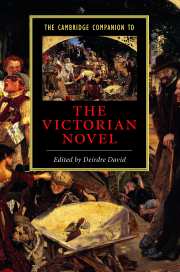Book contents
- Frontmatter
- Introduction
- 1 The Victorian novel and its readers
- 2 The business of Victorian publishing
- 3 The aesthetics of the Victorian novel: form, subjectivity, ideology
- 4 Industrial culture and the Victorian novel
- 5 Gender and the Victorian novel
- 6 Sexuality in the Victorian novel
- 7 Race and the Victorian novel
- 8 Detection in the Victorian novel
- 9 Sensation and the fantastic in the Victorian novel
- 10 Intellectual debate in the Victorian novel: religion, science, and the professional
- 11 Dickens, Melville, and a tale of two countries
- Guide to further reading
- Index
11 - Dickens, Melville, and a tale of two countries
Published online by Cambridge University Press: 28 May 2006
- Frontmatter
- Introduction
- 1 The Victorian novel and its readers
- 2 The business of Victorian publishing
- 3 The aesthetics of the Victorian novel: form, subjectivity, ideology
- 4 Industrial culture and the Victorian novel
- 5 Gender and the Victorian novel
- 6 Sexuality in the Victorian novel
- 7 Race and the Victorian novel
- 8 Detection in the Victorian novel
- 9 Sensation and the fantastic in the Victorian novel
- 10 Intellectual debate in the Victorian novel: religion, science, and the professional
- 11 Dickens, Melville, and a tale of two countries
- Guide to further reading
- Index
Summary
Herman Melville, a subscriber to Harper's Monthly Magazine in 1852, would have found there the serialization of Charles Dickens's Bleak House. Melville had just completed Moby Dick and was busily composing Pierre, or The Ambiguities. Bleak House might well have startled this alert, despairing American mind. Dickens, the best-known, best-selling Victorian author on the New York newsstands, could have been seen by Melville as writing a novel unmistakably indebted to the works of Nathaniel Hawthorne, the mentor-author whom Melville had nominated as the American equivalent of Shakespeare. If one considers Melville's “Bartleby the Scrivener: A Tale of Wall Street” (first published anonymously in Putnam's Magazine in 1853) it seems he fired back across the Atlantic a rejoinder to Dickens's apparent appropriation of Hawthorne. This textual encounter moves us quickly to the literary relations between British Victorian novelists and their American contemporaries, and it suggests how American writers in the mid-nineteenth century enacted a second war of independence in their major writings.
- Type
- Chapter
- Information
- The Cambridge Companion to the Victorian Novel , pp. 234 - 254Publisher: Cambridge University PressPrint publication year: 2000



